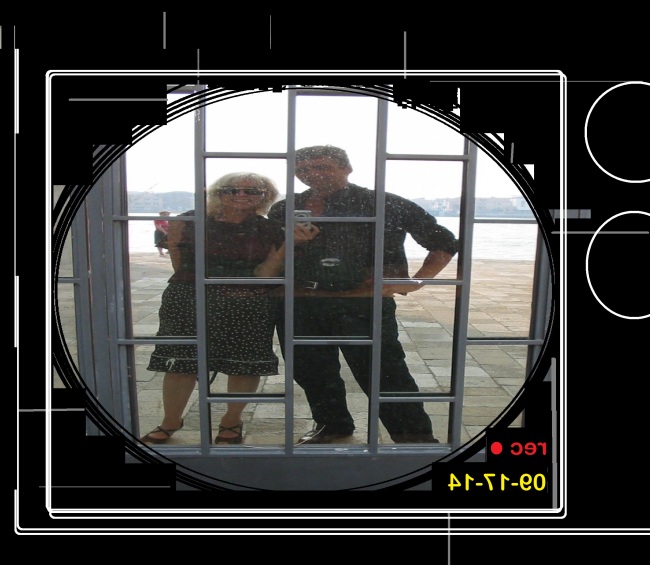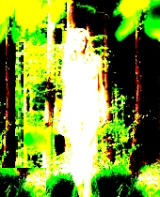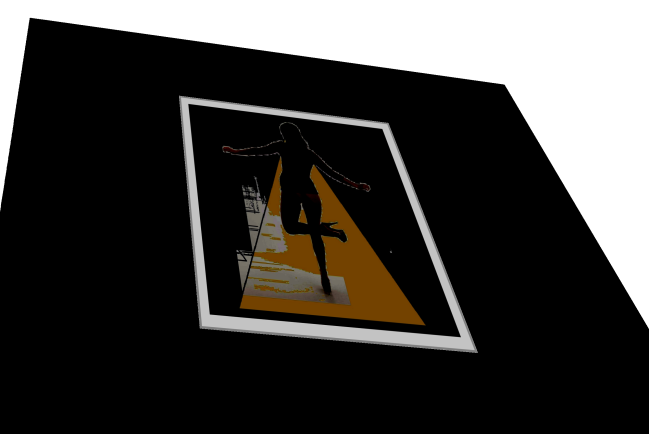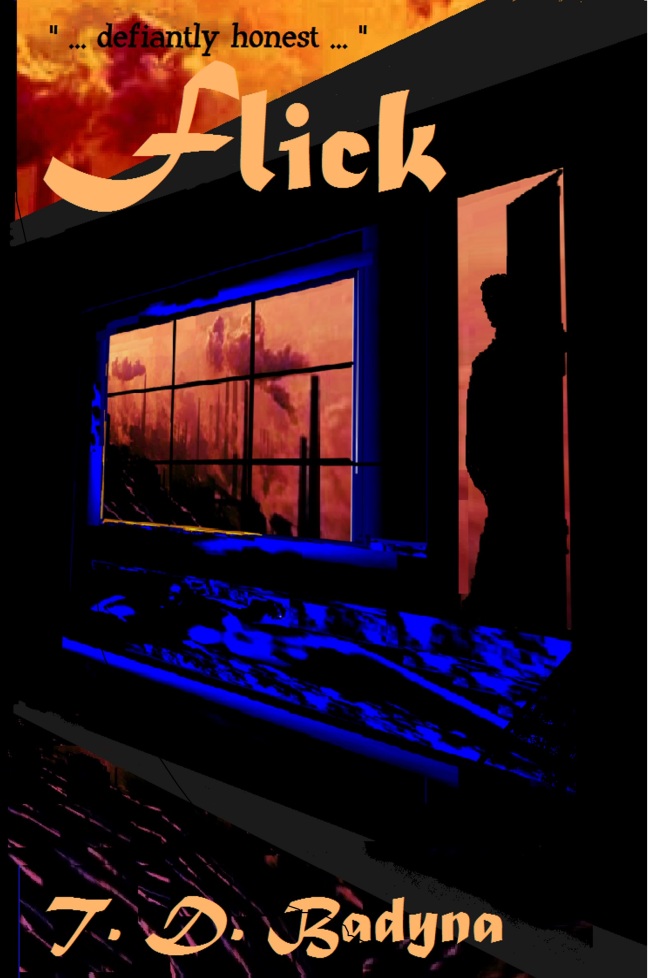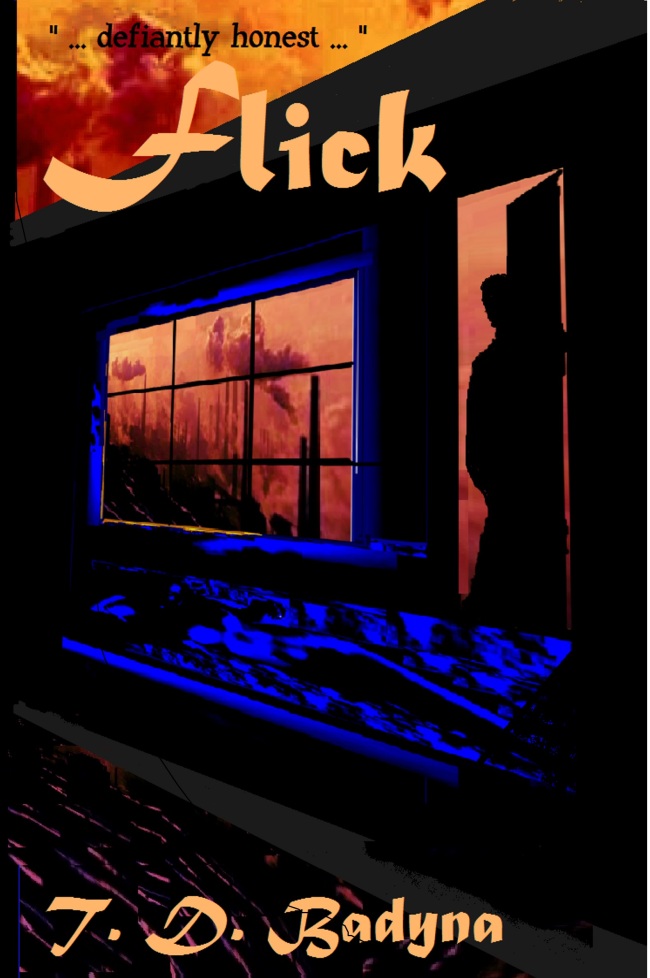from Trafficking in Received Wisdom
Future TV
by T. D. Badyna
Nietzsche began his great work, Beyond Good and Evil, with the line, “Supposing truth to be a woman … ” By it he meant that truth had to be pursued, wooed, seduced, that wit and no dogma were required. Were I to write a work of philosophy, mine would be on the Epistemology of Neanderthals and begin, “Supposing truth to be an emotion … ”
#
We think of the stuff that is true and valuable and beautiful about ourselves like we do about the gravitational constant, Pythagoras’s theorem, Avogadro’s number, Boyle’s law, the inverse of the square of the distance, so on. If they’re sometimes not true, they never are. Fiction is the science of that true and beautiful stuff. Its experiments are carried out by asking what-if questions.
What if a vagabond Ishmael got on board a ship captained by a madman after a white whale?
What if an ex-pat in Paris had had his dick, though not his nuts, shot off in the Great War?
What if Billy Pilgrim became unstuck in time?
Would what we hold to be true and valuable and beautiful about ourselves still then be true and valuable and beautiful?
It is a dark book that says no, our comforting truths don’t hold up.
An inspiring, affirming book says they do, even under duress, especially under duress, for some of us, for the good among us.
And then there are the books that are neither, that, instead, identify something about ourselves that is true and valuable and beautiful and didn’t exist before the what-if was posed. When a writer aims for greatness, if he understands what greatness is, this is his aim. It takes courage and luck and no amount of polishing phrases and reworking sentences and workshopping plot and character can hit the mark already missed. The storyteller has to believe that what is true for him is true for all men and also that no amount of interview with living souls, nor study of the literary scene, will get it properly out, nor that any amount of historical research will make more plausible his answer. There is no excuse for this behavior, but then there is no excuse either for insisting that what is true and valuable and beautiful about ourselves is other than answers to formerly posed what-ifs.
#
But we have lost this, haven’t we, that aim to identify in ourselves what didn’t exist before? It seems so. A year ago or so, in an attention-attracting essay in Vanity Fair, Kurt Anderson observed and detailed the dearth and absence, in the last two decades, of evolutionary and revolutionary advances in styles and aesthetics. Our technologies have dramatically changed, but our music hasn’t, nor have our books, nor buildings, nor fashions. This is true for no other two-decade period going back a hundred years at least. We seem, Mr. Anderson wrote, to be stuck on repeat.
He offered no cause or way forward, and whether his thesis is true or not, a case can be made for its opposite. In books, if one dispenses with literary elitism, there is the startling rise of fan fiction, vampires, hit men, fantasies apocalyptic, dystopian and otherwise, stories possessed of a common theme, that evil protects good. A killer or hit man or vampire protecting a young girl has become—it could be empirically said—a twenty-first century archetype and a sentimentalité extrême, a symptom of a fin de siècle to be swept away like Modernism swept away the last, but with us it’s been going on and on, thirteen years since Y2K, and nothing has changed.
Meanwhile, through it all, beginning the late eighties, there’s been a cultural-wide sense of an ending. Google “the end of” and limit your search to books and you’ll get, from the last two decades alone, over a thousand distinct titles that begin with The End of and detail the end of almost everything—history, art, the novel, the West, science, the family, children, the oceans, intelligence, leisure, work, money, God.
These are sensibilities different, but Mr. Anderson was no doubt onto something, an emotion at least. We have more writers, more literary writers, more writers of every stripe, writing and publishing more novels, more literary novels, far more than ever before, and they’re asking, most all of them, more what-ifs, better what-ifs, more imaginative and clever and complex what-ifs than ever before, but none of it resonates, not the way we’d have it resonate, not if we’re honest.
When we want for greatness, the emotion of it, and aim to identify that true and beautiful shit, we seem unable but to claim even for our rebellions a moral equivalency, an aesthetic equivalency, with past rebellions—and that’s new, too, different. From the Renaissance to the recent past, we’ve had new men arise from the thin air between writers’ ears and we haven’t that anymore. It’s as if we’re seeing the future, hearing its voices and have no answer for them, no ideologies, no new man, no words at all but a picking and choosing from what brung us to here. A decade and a half into the twenty-first century, and we have nothing new culturally, aesthetically, morally, nothing that wouldn’t have been much out of place a decade and a half back into the old century, except our phones take pictures and movies and absorb our attention as if they were a needful invention, a necessary distraction, something that had it not been invented, we’d have had to birth it.
#
It would be helpful, I think, for you to understand that I hold to the notion that mankind rides big, synchronous waves, and when they break, the mathematician and the poet ride them down the same. Parts of us hope that we’re on a big roller swelling ominously to shore and about to break like the last of its kind did a hundred and some years ago and was surfed by Sigmund Freud, Pablo Picasso and Henry Ford, James Joyce, Knut Hamson, Albert Einstein Isadora Duncan, Frank Lloyd Wright and Scott Joplin, Vladimir Lenin, Emma Goldman, Frank Lloyd Wright, the Wright Brothers, Thomas Edison, Sergei Diaghilev, Jack London, Henrik Ibsen, Margaret Sanger, Oswald Spengler, Nellie Bly, Enrico Caruso, John D. Rockefeller and Harry Houdini, impresarios all, of themselves—and us. It’s as if they were all surfing one wave the same, the breaking roller of the modern, and if they were doing it with thousands and millions of others, they did it such they became not only the symbols of this wave, they were credited with creating it. We look back and see that there was one world before them and another world after them, and across the centuries, one sees this again and again, and then decades after the break, one sees the frequency of creativity and and genius and greatness diminish. It is as if the wave is spent. Novelists, archaeologists and statesmen are on their surfboards the same, doodlely paddling on a sea becalmed.
#
Whether this abeyance is a calm before an apocalypse imminent or inevitable—as we seem to be kinda fantasizing about like never before—I don’t know. As long as man’s been writing, we’ve been heading for an apocalypse and have never got there, and that seems a truer thing than any one vision of the future. None of the dystopian scenarios have ever come to be is not important, never has been. The aesthetic appeal of the genre has nothing to do with its prophesying facilities. It’s the titillating fear that what we find to be valuable and beautiful about ourselves, if not already rare, will not be commonly true for the generations to come.
At the same time, narratives written about the past derive their power in significant part, in a curious prizing of originality, from the author’s facility in convincing the reader that he is revealing a history otherwise lost and that standards common to the present are suspect, a failure, a forgetting, even a betrayal of what was once beautiful and heroic.
That narratives about the past and narratives about the future have opposite views of the present state of man might be disconcerting to our beliefs in enduring values, and it ought to, but it’s all of a piece with the paradox at the heart of the storyteller’s dilemma.
A writer of stories of the present instinctively knows that his sensibility, even as it aims to nail the tenor and dilemma of his temporal milieu, cannot be that what this milieu commonly understands as its own. To get on paper, spot on, the exact sensibility that sends sparklies of resonance through the brains of his marks would necessarily lack the emotion of illumination and so couldn’t be that same sensibility. To get into words a world readers recognize as their own, the writer has to step outside of what exists and, whether through style, structure or substance, needs to distort reality, to make something up. He needs to be a prophet of the present, asking the reader to recognize himself and the world as other than he and it are. Only originality can feel true.
This is the logic and paradox of aesthetics.
But originality no longer feel true. This is the Occam simplest explanation for Mr. Anderson’s observation. It’s more a useful answer, one possessed of a generosity of spirit, of wisdom even, than to suspect a couple of generations of writers of being particularly without genius. It is, too, a more likely answer than to accuse, as so many writers do, two generations of readers and agents and editors and publishers of being immune to originality. For the writer, getting down on paper something about ourselves that is true and beautiful and didn’t exist before feels passé, contrived in his or her bones. You know that’s right—and, for the reader, the same comes off as gimmickry.
This is the dilemma of us.
If an apocalypse is coming, there’s nothing to do because it’s of our own making, made out of what we are and have been, and we haven’t the temerity to find in ourselves something true and beautiful and valuable and that wasn’t there before because all we’ve previously made of ourselves has left us and the world fucked. In many ways, ways you likely wouldn’t expect, we are—on a cosmic level, a metaphorical, metaphysical, a if-not-born-have-to-invent thing—slack-jawed and on the couch and watching TV from the future. Our souls, if we have souls, have already, I say, invented it. We’re collectively like Mozart in the movie Amadeus, the opera’s written. It’s all in our head, done, only—tee he he he—the last trifling details of transcribing it to paper, assembling an orchestra and a few singers, a pink and blue wig, a baton to tap tap tap the lectern.
We’re not so far from it. The physical laws of the universe, those tested and proven, make no prohibition against the possibility, which is to say that it’s a matter of technological advances only, none of them far fetched. The science is as plausible as Twitter and its effectuation as inevitable.
#
So what will you watch? What would I watch? What show’s popularity would we take as proof of our culture’s decline?
One of the financial news channels?
ESPN?
CNN?
But the question is, if you think about it, what will they put on?
Won’t they—their own contemporal audience watching their own Future TV—program for us?
And won’t we, Tuesday next, or a Wednesday further on, or Thursday next year, as soon as we’re able to watch TV from the future, the Web too, the creative among us, begin to program and write and perform for our immediate past?
Won’t the future, performing for us and watching their own Future TV, not contrive something new and true and beautiful and valuable about themselves that wasn’t there before, but ask of us, in the subtle subconscious ways of art, to be other than what we are that so fucked them?
And won’t we do the same?
And aren’t we already doing it?
And so won’t art—instead of advancing on the aesthetic achievements of the future, leapfrogging ahead—on those of the past, do a reconfiguring, a reimagining, of yesterday’s new men, and each wave of present-day artists will create, as it were, Postmodernism before Modernism, Surrealism before the Realism, Naturalism before Transcendentalism, Romanticism before the Enlightenment, the Restoration before its fall, chowder-mouthed Chaucer before the Shake-a-Spear explosion and so on, from then to forever. History, art and aesthetic history at least, will run backwards. Our heirs, like we are soon to be our own, will no longer have the heretofore natural sense of the future as apocalyptic. We will be watching it, and the future will have the cast of the pathetic, as they struggle on in a world diminished by what we have, as we race backwards, stolen from them—possibility—as they helplessly steal from their heirs. And the past, instead of the heretofore heroic, becomes villainous, in need of reprimand and fixing.
And hasn’t this already happened? Have not our arts begun this race backwards? Doesn’t this explain the overly long Postmodern that fizzled with nothing to replace it but a reimagining of former advances? Aren’t we in some ways already, literary ways at least, at about 1916 now, our best writers, anti-voluptuaries all, putting away their bangley flapper shifts and tying up their fuck-proof corsets for a date with a palimpsest-skinned Henry James unpacking his old attic wares? Don’t we read in the forced manners of our newest stories the awkward twinkle-in-the-eye last of Modernism, Sherwood Anderson in the parlor like Benjamin Button, getting younger, almost pre-Modern, scuffed shoes pigeon-footed, self-conscious, making to leave—through the womb?
We don’t write or act as if clearing the way for ourselves. We’re watching the future and going backwards and thereby stealing from our heirs, and they, from their distant perch, can do nothing about it.
#
So what will you watch?
The news?
Think about it.
If the revolution is to be televised, as predicted, with Future TV it will be televised before it happens—which sounds as if already true, no? Its belief in itself will be so long dissipated by the time its living actualization arrives that it can be little but a feeble and affected striving for an old justice that, if bothered enough to be achieved, will be disowned by its heirs, even as those heirs were once, yesterday, the day before, the very perpetrators of what is being disowned.
Only the revolutions of yesterday, pre-Future TV days, have caché, resonance.
#
Milan Kundera, born 1929, a living fossil, writes in one of his recent books, Encounter, of the two springs of Europe’s 1968, that of Paris and that of Prague. “Paris’s May was a high-spirited challenge to a European culture viewed as deadening, tedious, official, sclerotic. The Prague spring was an homage to that same culture.”
We cheerfully hold to both revolutions, untroubled by their contradictory aims and content. But poor, old Kundera—he’s old. He cannot reconcile their differences. He doesn’t get the essential harmlessness that either has become.
Think of the heroes of Paris and Prague 1968 as if they had Future TV and could see what we would do with what they were about to do. Would they, do you think, have gone to quite so much bother? Would they have, in their originality, felt quite so much truth?
We recognize ourselves only in what used to be true, a little of this, a little of that, a little Paris, a little Prague, part pirate, part party girl. Words still feel true, but differently.
We have yet our old brains, the reptilian brainstem and medulla oblongata, the limbic system, amygdalala, pineal gland, cortexes up the wazoo, same neurophyisology as had Moses and Descartes, and we do what we can to tickle up the emotion of truth, and if we once and for a long time believed that the unity we found in fiction, art and song enfranchised our souls, it doesn’t anymore, though we’re yet stuck with our old brains. We’re trying to play hip hop on the violin. We’re chimpanzees looking out the rocket ship of us.
#
The world we love is coming to an end, the one wherein we recognize ourselves—and I mean other than the world with song birds, narwhal whales, six million species of South American beetles. I mean something deeper than that the terrors of lions and tigers and wolves exist now as wards of our charity, that mountain redoubts have become suburbs of our imagination, Everest little more than a snowboard park, Shanghai about as exotic as a South Dakota county fair.
What is coming to an end is what was us at our deepest and most humane, our most compelling and brilliant, all that was only possible with originality, and originality was always, at heart, a cry I, I, I am here now.
Whether the memoirist’s I or the entirely fictitious I of the storyteller, that sense of I had to be original to have power, to feel true—and it doesn’t anymore. Any novel representation of man or his soul or place in the cosmos feels as not much other than a momentary accomplishment, not much more than commentary. Any possible aesthetic or sensibility itself feels to us no different, of no more importance, than the clothes one wears, the list of books one likes, no more than another item in a collection of traits by which we attempt to identify ourselves—photos, music, opinions, likes and dislikes, truths and fictions. Any artistic representation of man cannot but be seen as a more-or-less elaborate Facebook page. We traffic in received wisdom like boys of old traded baseball cards.
It wasn’t that way before, but that’s how it is now.
Originality doesn’t feel true.
And we’re fucked.
#
But if originality no longer feels true, and only originality can be true, emotionally true, then how can we still feel the true, which we do?
Because lies do.
Lies feel true.
You know this sounds right.
Studies have shown that the more one has doubts about one’s own beliefs, the more passion one will exhibit when defending those beliefs, or proselytizing for them. In the famous David Gal-Derek Rucker study, the more research subjects were forced to confront evidence that undermined their core convictions, the more forcefully they advocated for their original beliefs.
You know this is true. You know the feeling. Only lies feel true, especially sentimental lies.
And what we have left then, the honest among us, is charm—the saving third rail of aesthetics.
Charm—the acting as if you were beautiful or as if she were beautiful, the acting as if something were true that is not and doing so in such manner that wins you over, though you know it is not so.
Charm we have as a species, as well as opposable thumbs, and whatever the future holds, it will be held by those holding it, and some will do it with charm. Whatever we think of the logical apocalypse of Future TV, when we watch it, we will do it best with charm, as if all our old worries were so much piffle.
That’s how it will work.
The realities of physics require that before future people can decide whether to watch The Revolution or Super Bowl CLXVIII or Desperate Housewives of Planet Pluto, they will have to watch Wolf Blitzer broadcast from three hours into the future, then three hours and one minute, three hours and two minutes.
And before we can get the evening news at three in the afternoon, we will have to watch Wolf Blitzer broadcast from ten minutes into the future.
And before that, we will be used to Future TV upon its very birth. The week of its inaugural broadcast, Wolf Blitzer reporting from thirty seconds into the future, Time Magazine will have on its cover an image of Future TV calamitous or celebratory, and, six months later, with Future TV broadcasting from tomorrow, old people will do what old people do, miss their villainous past, while the young will dance pointlessly assured that what’s hot today can make no headway into a diminuted future.
And a year on, the broadcasts coming from next month, those renowned as the more brilliant among us will, in a thousand op-eds and think-piece essays, still be laboring after this news, whether to craft it into a signpost in the decline of man, or in the birth of a new age, even as mankind continues to watch neither happen.
This is the human apocalypse, the eradication of the future by its actual witnessed existence, terrible to us, ironic to an infinite degree, but to those living it—some of them will do so with charm.
#
So, when you can watch TV from the future, what will you watch?
I’m guessing you’ll likely watch the same channels you watch now, and, after a brief fascination, you will watch with roughly the same raptness, boredom, curiosity, whatever, as you watch now.
You will eat your dinner in front of the TV, as you do now, but saying to your wife, “Look—look it’s the future. It kind of misses the point if I TiVo it.”
Or you will turn it off for the same reasons you do now and go into the kitchen and open wine and make ragout or risotto and sniff the savory.
And though maybe a fungus will have wiped out future grapes forever, like the American chestnut trees of old, and you will think the wine more unbearably precious than you are capable of tasting, or even somehow morally wrong to connoisseur sip what will be extinct, you will drink anyway, eat anyway, and do so pretty much as you do now, and then you will fuck or not fuck your wife or your girlfriend
or boyfriend
or neighbor
or niece
or dog
and do so about the same as you do now.
And then you will kneel down by the side of your bed and pray, no matter what it is, for a different future.
Trust me.
